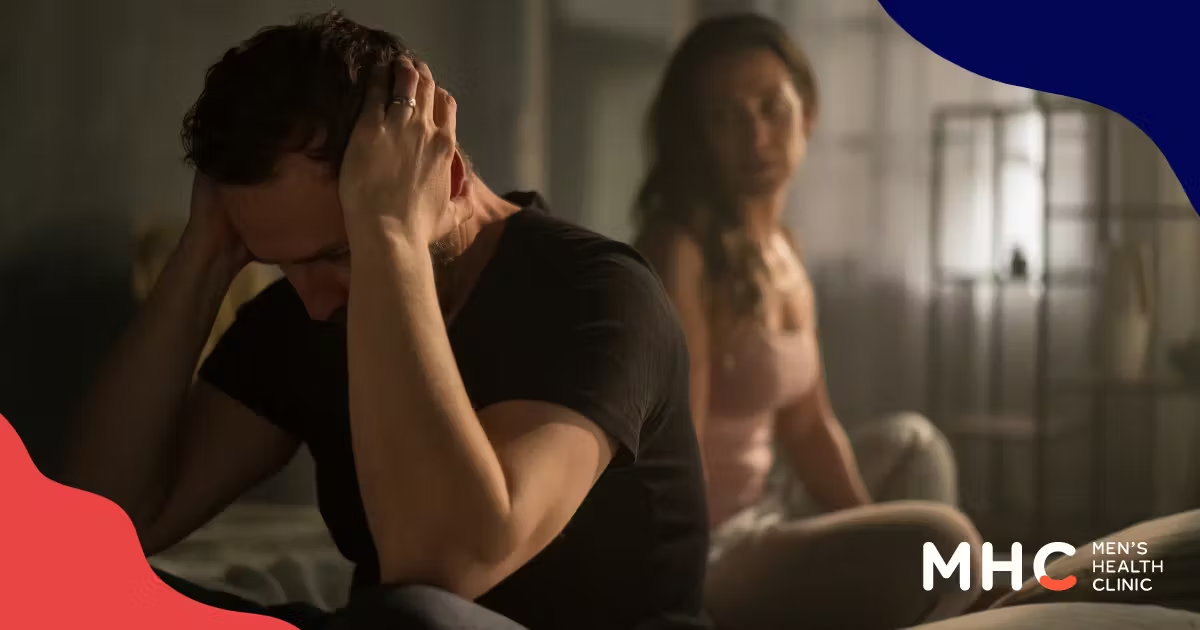Anxiety is one of the many emotions we usually deal with. If not managed, it can torture the mind and can negatively affect our daily lives. But aside from the toll that anxiety takes on the human mind, it also has physical manifestations like an increase in blood pressure, headaches, and overall tiredness. What many don’t know is that anxiety can also cause premature ejaculation (PE). If you feel that your bedroom performance has been underwhelming or if you’re experiencing PE more often than usual, you might be seeing physical manifestations of anxiety.
In this piece, we will tell you more about the connection between anxiety and premature ejaculation. We will also share some treatment regimens for the management of anxiety and premature ejaculation so you can get your mojo back and be the lover you aspire to be to your special someone!
Anxiety and Quick Ejaculation Link
If you experience ejaculation within one minute from the start of sexual intercourse, there’s a great chance that you’re suffering from PE. This is not something to be ashamed of. In fact, according to a study published in the National Library of Medicine (NLM), between 20 to 30% of men suffer from premature ejaculation. The said study also showed that men suffering from PE also reported other sexual problems associated with an increase in anxiety and interpersonal difficulties.
So, why are anxiety and premature ejaculation linked? Anxiety takes many forms that can result in premature ejaculation. You might be experiencing performance anxiety. This means that you might be afraid that you won’t satisfy the sexual needs of your partner. Or you might feel that your partner’s expectations are too high, and you won’t be able to deliver. Some are anxious about sexual activities in general. This can be due to inexperience. A man might be anxious because he thinks he doesn’t know what to do when it’s time to do the “deed.”
Other causes of anxiety and premature ejaculation include:
- Clinical Depression – The NLM published studies showcasing that depression was associated with a statistically increased risk of premature ejaculation (as compared to those with no depression).
- Relationship problems – Problems like financial issues, arguments, lack of communication, trust issues, and the like can seep into your mind. When your relationship is constantly challenged, it’s likely that you’ll experience sexual dysfunctions like premature ejaculation and erectile dysfunction as your mind is focused on something else. Hence, you can’t enjoy the moment, which affects your ability to control your arousal and ejaculation.
- Poor body image – The way you see yourself is also a factor for premature ejaculation. Body image anxiety increases your stress and self-consciousness in the bedroom. The negative feelings about your self-image can lead to performance anxiety and premature ejaculation.
Treatments for Managing Anxiety
Let’s take a closer look at some of the best treatments for anxiety to help you manage both anxiety and PE:
Cognitive Behavioural Therapy
Cognitive Behavioural Therapy or CBT is a type of therapy that involves talking to a therapist. The main goal of CBT is to help you manage your anxiety by improving the way you think and behave.
Cognitive Behavioural Therapy stems from the concept that the way you feel, think, and act are interconnected. As a result, having negative thoughts and feelings can trap you in a negative cycle with anxiety at its centre.
So, how does CBT work? Cognitive Behavioural Therapy often involves sessions with a therapist. Each session can be between 30 to 60 minutes, depending on your therapist and the topics you need to cover. You can have between six to 20 sessions. During CBT sessions, your therapist will break down your problems into separate parts, like the way you think, act, or feel.
You and your therapist will then analyse these areas to see how they affect you. Your therapist will then help you find ways of changing your unhelpful or negative thoughts and behaviours.
Cognitive Behaviour Therapy can help you relieve anxiety, but only if you are truthful with your therapist. You also need to devote time towards attending sessions and carrying out work between sessions if you want the therapy to work.
Relaxation Exercises
Relaxation exercises pose little risks, so almost anyone can benefit from doing them. These types of exercises help relieve anxiety, lower blood pressure, control blood sugar levels, ease muscle pain, improve digestion, and even improve the quality of your sleep.
Here are some relaxation techniques you can try to get started:
- Autogenic relaxation: Autogenic pertains to something that comes from inside yourself. This relaxation technique involves using body awareness to help you cope with what’s stressing you out. Start by repeating calming words to yourself to relax your heart and mind. You can also use visualisation to lower your stress. For example, you can try imagining that you are in a place where you are most at peace, like a quiet lakeshore, an empty church, or anywhere you feel peaceful. Once you are in your peaceful place, you can work on slowing your heart rate or relaxing your breathing.
- Box Breathing: This is a simple breathing exercise you can use before, during, or after a stressful situation. What’s great about this technique is you don’t need to be in a quiet environment for it to work. You can use this breathing exercise in the bathroom before sexual intercourse to lower your anxiety and prevent premature ejaculation.
- Box breathing involves just four simple steps. First is to breathe through your nose for a count of four. You can then hold your breath for a count of four. Release your breath for a count of four. The last step is to hold your breath for a count of four. You can then repeat these four steps. What’s good about this exercise is you can adjust the count depending on your comfort. You can shorten the count to two seconds instead of four and increase the length as you get more comfortable.
- Group relaxation exercises: If you feel that being in a group will be more relaxing for you, there are many group relaxation exercises you can join. You can join a Tai Chi or Yoga group. There are also meditation classes you can enrol in. If you want to harness your creative juices to relieve anxiety, you can try joining an art or music class.
Lifestyle Changes
Premature ejaculation management can also involve lifestyle changes to relieve anxiety. For example, you might need to set aside time to exercise daily. Exercise can lead to a healthier body and a better mood. Instead of eating junk food regularly, consider eating more nutrient-rich food.
Having sufficient sleep also contributes to a healthier body and lower anxiety. Make sure that you get enough sleep every night. One thing that can help you if you have trouble sleeping is to establish a regular sleep routine. Go to bed at the same time each night. Make sure that your environment is conducive to sleep by keeping it dark and at a temperature that is most comfortable for you.
Support Groups
Joining a support group can help you relieve stress. This is an excellent option if you are uncomfortable with individual therapy sessions. In a support group, you can share your experiences and listen to those of other members. It is also an excellent way of learning about the coping strategies that others use.
Support groups can also do wonders for your morale. For one, you get the feeling that you are not alone in your battle against anxiety. You can also gain hope by hearing the success stories of those who overcame anxiety. Lastly, other members can provide you with valuable feedback about other treatment methods you can explore.
Self-help
Not all of us are comfortable enlisting the help of others. If you are one of those who want to solve issues by themselves, you can go the self-help route. Read a book about anxiety and how you can manage it. There are also many online resources you can use, like guided videos or online articles. There are even mobile apps to help users living with anxiety. These self-help options are excellent for those who want to get treatment at their own pace or inside the safety and comfort of their homes. However, spend time researching the authors of the resources you will use. Make sure that they were made by experts in the field to increase your chances of success.
Medication
For people experiencing long-term anxiety, their physician may recommend taking medication. Common medication for people suffering from Generalised Anxiety Disorder (GAD), include Selective Serotonin Uptake Inhibitors or SSRIs, Serotonin and noradrenaline reuptake inhibitors (SNRIs), Pregabalin, and Benzodiazepines. However, these medications should only be taken upon the advice of a doctor. Be sure to inform your doctor if you have other underlying medical conditions to avoid complications or contraindications. It is also crucial that you inform your doctor immediately if you experience any adverse effects upon taking any of the medications mentioned above.
Open Communication
Talking to your partner (or anyone you trust) is beneficial not only in addressing your anxiety but also in managing your PE. If your partner knows what you’re going through, they’ll better understand why you can’t perform instead of simply feeling disappointed why. There will be less pressure in the bedroom, and you can foster trust and create a more profound connection with your special someone.
Conclusion
When you’re dealing with on-going anxiety and stress, premature ejaculation can simply be a symptom of a bigger problem. PE indicates that you need to prioritise your mental health as it’s closely tied to your physical abilities, including sex.
If you believe that your anxiety is the source of your troubles in the bedroom, it’s the best time to stop moping and start moving. There are numerous ways to help manage your anxiety and early ejaculation. You can join support groups or undergo CBT. Lifestyle changes such as an exercise routine, a balanced diet, and a regular sleep schedule can also do wonders.
Of course, consultations with a health expert are proven beneficial as they can help you choose a treatment that will yield the best results. To get started, don’t hesitate to book a consultation with the Men’s Health Clinic (MHC). MHC’s team of mental health experts and general practitioners specialising in men’s health can develop a treatment plan that will help you address both PE and anxiety. With customised treatments, you can leave premature ejaculation and anxiety behind.





